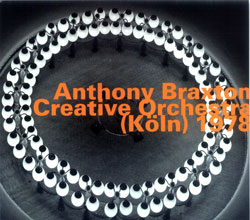
In his book Creative Life: Music, Politics, People and Machines (University of Illinois Press, 2009), Bob Ostertag writes about being asked to join Anthony Braxton's Creative Orchestra in 1978. Braxton was a guest lecturer in a music improvisation class at Oberlin College in Ohio and heard Ostertag and his hand-assembled Serge synthesizer during a workshop. Braxton asked him to join his Creative Orchestra for a tour of Europe on the spot. Ostertag left school and relocated to New York. At his first, Braxton gave him a score for keyboard, something his patchboard of circuitry didn't have. When he pointed out that he didn't have a way to play the score, Braxton told simply him to figure it out.
"My time with Anthony was short, but the experience was formative," Ostertag writes. "Anthony taught me how to incorporate a sense of struggle into music. Struggle permeates all his work - struggle with graciousness and a sense of humor: his entire sense of creativity, his extraordinary virtuosity, his impossible parts, the frenetic energy of the music, his insistence on projects that demand more resources than he can garner, his delight in putting players in situations where nothing is easy and the outcome is uncertain."
The orchestra played five dates in Europe that May. The same month, while at Oberlin, Braxton recorded his massive Composition 82 for four orchestras and began composing a new orchestral piece, Composition 71. The ordering here may raise interesting questions about Braxton's numerology, but in any event Braxton clearly had big bands on the brain.
The first stop on the European tour was in Koeln, Germany, and was released in 1994 (and now reissued) on hatOLOGLY. Along with Ostertag's electronics, the 20-piece band included Marty Ehrlich, Vinny Golia, J. D. Parran and Ned Rothenberg (reeds); Leo Smith, Kenny Wheeler, Ray Anderson and George Lewis (brass), Jon Lindberg and Brian Smith on basses, Birgit Taubhorn on accordion, James Emery on electric guitar, Bobby Naughton on vibes, pianist Marilyn Crispell and percussionist Thurman Barker. It's a big band with a huge amount of talent. Braxton himself conducts (with the sort of real-time arrangement methods that would inspire Butch Morris and John Zorn) but doesn't play, which allows for a greater focus on both the compositions and the ways in which Braxton creates space for spontaneity, both on the part of individual players and himself as he guides the big band.
The two-disc set (coming in at 104 minutes) opens with a 15-minute piece entitled "Language Improvisations," a fascinating (and very musical) sort of warm-up exercise. According to Graham Lock's excellent liner notes, the orchestra sections are given sets of 10 gestures (long sound, staccato line formings, angular attacks, etc.) which Braxton uses as cues for the ensemble. These "language types" also constitute the vocabulary for improvised passages (often for unaccompanied soloist) that serve as transitions between the five pieces that make up the rest of the concert. The program makes Creative Orchestra (Koeln) 1978 a particularly fascinating document from this period of Braxton's music. It includes compositions 45, 51 and 59, which might be called (if we will allow an illustrative misnomer) his "creative" work. Composition 45 is the oldest piece presented here, and the only one that didn't also appear on the studio LP Creative Orchestra Music 1976 (available on the 2008 Mosaic Complete Arista Recordings box set). It's a piece full of varying sound environments and shifting sub-groupings, yet it's structured like a big band jazz number, with a system of "trading fours" soloists. 51 likewise is a "jazzist" number, constructed according to Braxton following the "essence brilliance of post-Henderson/Ellington structural dynamics" but following (Lock here) a complex "A B C D E1 F1 F2 F3 A2 E2 G G2 A3" sequence. Which is to say, nothing is easy in Braxton's music, although when he's most successful (as he is here), it sounds like it is. 59 finds its inspiration in Stockhausen with 48 "time-cued sound compartments" which work within a graphic score, creating some of the densest beauty heard in this concert.
Bookending the density of those three works is a pair of pieces that demonstrate the breadth of Braxton's vision, and which makes this a good starting point for understanding Braxton's 1970s work. Moreso than the jazz structuring of 45 and 51, Composition 55 is purely a jazz number. Drawing heavily from Ellington and Mingus, Braxton said his inspiration here was to "capture the wonder and magic of big band swinging music," and from a rollicking Crispell solo to a fascinating horn/percussion breakdown, it does so wonderfully. It was probably something of a surprise for concert goers, coming from the hero of the avant garde of the day, and is still something of a surprise today. When truly realized, Braxton's complexities can be filled with joy, and 55 shows that, as does 58. Also on the Arista LP but more infused with life here, 58 is one of the great moments of Braxton's '70s large ensemble work: an all-out, Sousa-inspired march. Braxton is a great arranger, but there have been scores of great jazz arrangers. Hearing the ins and outs he spins through marching band music, while always remaining faithful to the form, not only underscores his deft handling of the big band, but is also 13 minutes of pure fun.
Overall the playing here is more spirited than on the Arista recording of the previous year, no doubt in part because of the presence of an audience. Only four of the players were on both sessions, so certainly the performances are quite different, and the presence of Ostertag's bloops and whirrs make this an even more unusual reading, and a high point in this period of Braxtonia.
Comments and Feedback:



More Recent Reviews, Articles, and Interviews @ The Squid's Ear...


|

